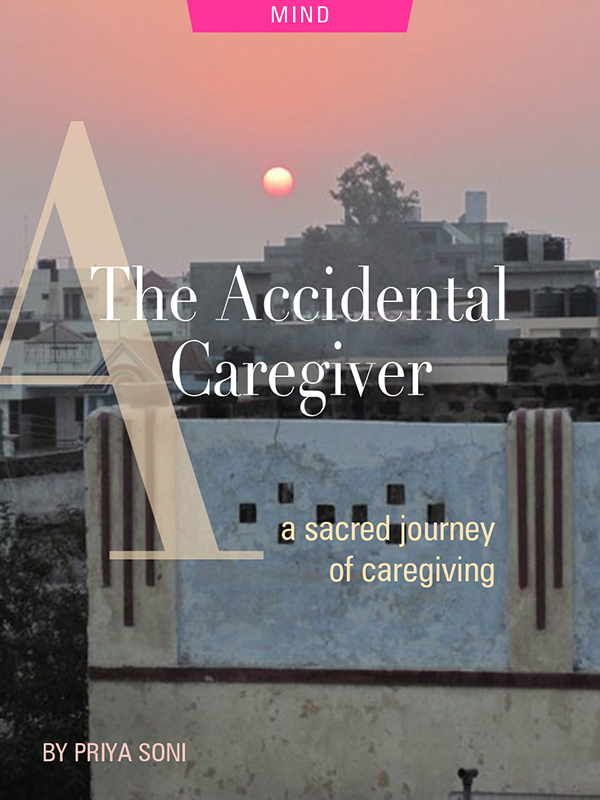Estimated reading time: 14 minutes
Caregiving and grief connects a young woman to her rich ancestry and an unexpected soul calling
—
Through the noise, purpose was born.
Priya Soni
SACRED BEGINNINGS
The moments that define our perspectives about life are not always discernible. In fact they can be as soft as a whisper, a waft of a childhood memory. Nonetheless, they leave their imprint. There is one defining moment for me that has remained throughout some of my most challenging times. It was the first time I felt like I was being held by a force larger than me.
Temple on Sundays was a sanctuary for my family. As I entered what I considered, in my 7-year-old eyes, ‘a gigantic room’, I immediately felt at home. The room was full of men, women and children focusing their energy on several kirtans — spiritual stories voiced or sung, that convey a collective feeling and connection that we receive from a higher power. Music accompanied the kirtans. The drumbeat of the tabla attracted my attention.
A man with long jet-black hair, tied in a loose bun veraciously played his tabla, eyes closed, swinging his head left to right, harmonizing to its rhythm and sound.
His adoration to his faith was palpable. I was enamored by him and his effortless comfort with expressing his devotion. I wondered what it felt like to feel even a sliver of the joy that emanated from him.
Being a shy child, my mother escorted me to the front of the room at the end of each visit. She softly voiced, “Put this dollar in this pile here. That helps the temple with their services. Drop to your knees. That shows respect to the holy among us. Place your palms together and say “num-us-tay.” That means: “The sacred in me bows to the sacred in you.” Smiling, she continued, “We are one.”
As I grew older, the meaning of sacred exploration was impacted by my maternal grandmother and paternal grandfather. Nani, my grandmother, was very vocal about her beliefs and admiration of a higher power. They were her Gods, emitting an infinite wisdom.
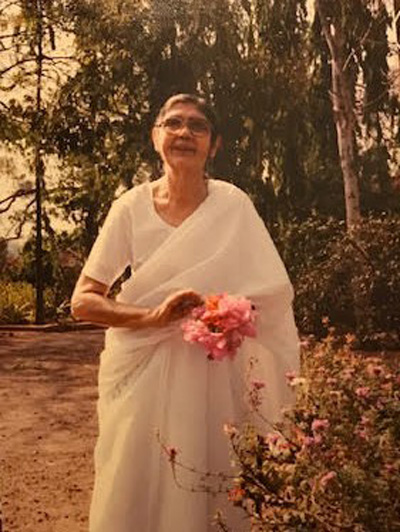
One of my favorite memories was observing her delight as she talked about her lifelong dedication to spirituality. She became a schoolgirl, giggling at the wonder of it all and said excitedly, “I’m telling you, I saw honey come out of the Gods. Sweet and pure. My soul was alive!” And right then and there, I knew any summoning of her most authentic self surpassed the space and time in which she existed. She epitomized true love, far reaching and rippling for years to come.
Papaji, my grandfather, was a simple, honorable and harmonious man. He was invigorated by his commitment to value all humanity.
He educated people with his smile. In the time that he lived with us, which was less than a year, I observed his allegiance to spiritual scriptures. Through him, I learned to treasure stillness as a companion, having the power to embrace any magnitude of crisis. He believed in order to repair the divisiveness within our collective human condition, we must be willing to see the goodness situated within others and ourselves. Only then can we live with a peaceful heart.
Listening to my heart would become my most valued compass as it guided me down paths I could have never imagined I would walk.
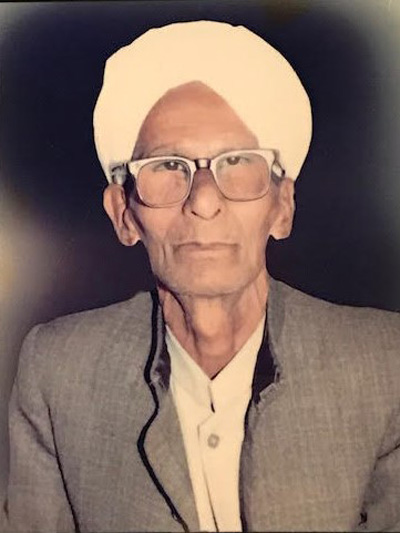
SACRED LESSONS
In the fall of 2003, my mother called me in New York. “Your father’s gait is having problems. We have gone to see some specialists, but they don’t know what it is.” “His gait?” I asked. She continued, “Priya, he’s been walking funny and complaining of stiff legs.” I put the phone down convinced that this was a fleeting issue. My father was unquestionably strong-willed. He was born to conquer any challenges that stood in his way.
It was not until I came home to Maryland for Christmas in the winter of 2003, a month before I moved to Los Angeles, that I realized the decline of his health. He seemed older and frail, but still determined to take on his daily activities. He was not able bend his legs so when he walked, he wobbled side to side, carefully rationing off the energy it took to get from point A to point B.
My father was a man who prided himself in expedience and his effortless ability to mold “no” into a complete sentence. It is perhaps what many first generation immigrants feel as they make a home in a new country, the nudge of possibility and the urgency to grasp hold of the accomplishments already created — an uncomfortable steadiness that sustains. His quick-paced nature was no longer his most prized quality.
After continued and repeated visits to doctors and specialists, we would forever learn the true meaning of living in questions.
Medical professionals were unable to ascertain a diagnosis as every test run was negative, normal or inconclusive. What they could determine was that he had a neurological condition that would gradually show its degenerative presence over the course of an unknown number of years. He was only 63 years old. My heart was broken. I dreaded staring into the abyss. But what was more chilling was the unfathomable staring back at me.
Caring for my father over the course of 12 years gradually increased in its intensity, given the arc of time. Moreover, my role as caregiver, or as I would say, ‘dedicated daughter’, looked different as time progressed. At first, it was a supportive role, being encouraging from afar. Then it was regular touchpoints and being more practical in nature as I recognized significant signs of the illness. His challenges in speaking became more apparent. He started to have slurred speech and his voice had a coarse undertone. My father refused to see a speech therapist. I imagine visiting another specialist was a reality too harsh to digest at the time.
Given my training as an actor, I was familiar with the techniques of voice training. So most days, I sat on the phone with him rigorously practicing pronunciation, breathing, pacing and articulation. Witnessing him struggle to pronounce each word made me grieve the days where he robustly exercised his loud voice, most often boisterous call outs of our names from the bottom of the stairs, “Priyaaaa!” I wondered daily how he would operate in a world that often correlates one’s communication with success and leadership. He was an Indian man with a thick accent so the road to prosperity had more consistently been strewn with many bumps and bruises.
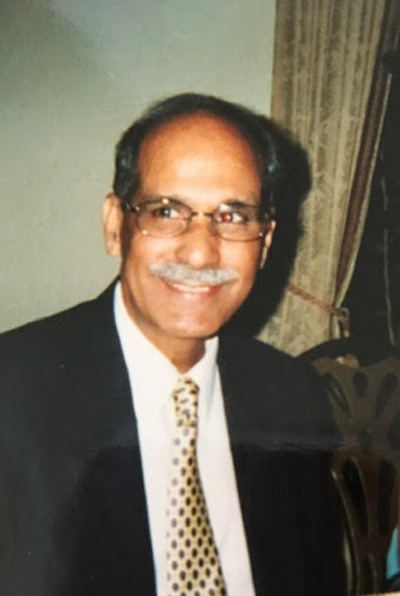
Nevertheless, that could not compare to what was ahead. I was determined never to let any of us surrender to the intimidating nature of this illness. As the years progressed, so did my visits from Los Angeles to Maryland. I often felt I was living two lives, faithfully pounding the pavement with auditions and a cherished community of friends — and anxiously settling into uncharted territory, alone as a long distance caregiver.
According to statistics, the average age of a family caregiver in the United States is a woman in her late 40’s, who works and provides unpaid care for at least 20 hours a week.
I was in my late 20’s, an actor running from one job to another in a car that broke down more often than I can remember. This was not an average situation, if there ever could be one with caregiving.
In the fall of 2007, my parents moved to Oregon, where my sister lived. This way they were closer to my sister and me. Visits home became easier and more frequent. My silence about our ‘family situation’ grew more profound. I was fiercely protective of our experience and I had come to accept that no one outside of our family could relate to the depth of anguish we moved through every day.
My heart skipped a beat every time the phone rang. I had gone from being a dedicated daughter to caregiver to manager of crises. We were always in crisis. One day my mother called me to share my father had fallen again and this time ‘he was lucky’. She was frantic with concern and understandably emotionally drained. At this point, it had been years of me juggling a double life and I was depleted of energy with caregiving from a distance. It was time to come home, so I left Los Angeles and moved back in with my parents.
I have perpetually felt a huge responsibility and found purpose in caring for my family from as early as I can remember. Perhaps it was the cultural norm of being the eldest Indian daughter. But most definitely, it was from witnessing my father do the same from afar with his family in India.
It was not until the moment I arrived at my parent’s house with two large suitcases that I realized my life would drastically change. I stood at the curb outside my parent’s home, paralyzed with fear. As I opened the front door, my father took my hand and softly said, “I’m sorry.” He was overcome with guilt.
For months, I engrossed myself in a life of care. It was a practice of patience and stamina. I often felt I was shedding skin, trying to grasp on to a sense of identity, tirelessly aching to give birth to a new self that I recognized emerging. Days were complex and demanded creative thinking. My to-do list was filled with a multitude of tasks that included monitoring his breathing and developing handmade communication tools so he felt heard. It moved to blending foods as he had difficulty in swallowing, which is common with nervous system disorders.
What I had not accounted for in his last several years was speech aphasia — a communication disorder, which ceased any ability to communicate his needs. He moved from walker to power chair. As soon as we could find some course of comfort in how to continually manage his daily needs, I moved back to New York, but traveled back to Oregon 4-7 times a year to oversee his care. In his last few years, he lost all mobility and required care 24 hours/7 days a week. We were fortunate to find two caregivers from Tibet who understood our culture and what we valued with care for my father.
Making sure he had a voice was of utmost importance to us.
My father spent many years as a forensics chemist and was as scientist at heart, full to the brim with curiosity and a keen observer. After much searching, my sister found a speech augmentation tool for his iPad that allowed my father to type his transformed beliefs. I sat with him for hours and occasionally I saw the glimmer in his eyes again as his new hypotheses for life were proven through the insights of his writing.
On a monthly basis, my mother had friends and family over, calling it a spiritual discussion group. With one single button, his new interpretations of subjects such as acceptance, happiness, serenity and even death were revealed. All he had to do was press, ‘play’. As I listened to my father’s words shared out, I was once again a novice discovering the world around me, listening to his kirtan, remembering that we are one.
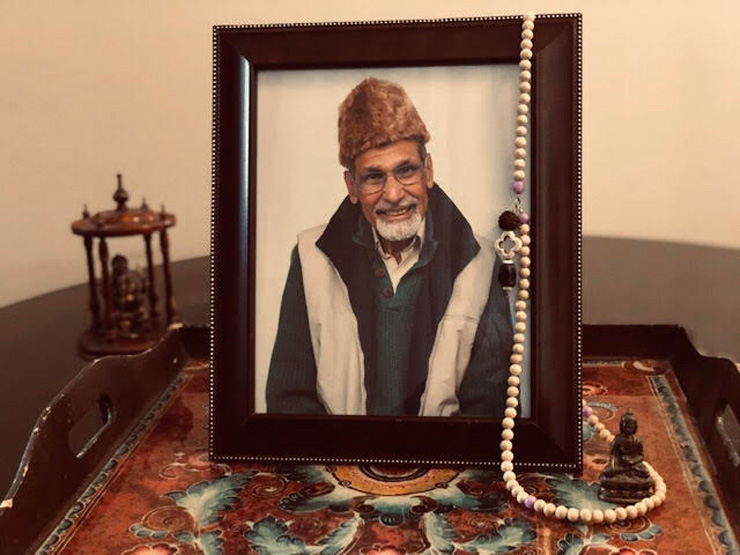
For 12 years, my father was dying an excruciatingly slow death and yet, in the experiencing of that is where I learned to live. Caregiving is extraordinary because it asks you to live in contrasts every day.I felt reduced by the treacherous and unpredictable effects of my father’s illness. And it taught me that the self-resilience I had been seeking for years was nestled within me. It educated me on the depths of suffering, an uncomfortable place to inhabit and a residence drowning in compassion. Compassion has become a way of life. It has allowed me to become more indulgent in the present and has been my host to forgiveness. It has asked me to thrive in a land of simplicities so that every day I am inspired by the soft whispers of life.
I am in awe of the humanity that was exhibited by the hospice workers, caregivers and our community. As the years have moved on beyond my father’s passing, they continue to encapsulate us with their warmth during harrowing and uplifting times. Most importantly, I will forever be in partnership with my father as I walk through this ‘gigantic world’. He was my greatest teacher, repeatedly leaning on the wisdom of hope and fury, and unapologetic in his vulnerability. Caregiving has created a revolution in my soul, one that that will forever cultivate a sacred resting place for my heart.
SACRED ASSIGNMENT
An open heart has encouraged me to have more lightness in my steps and greater agency in how I live. It also enlivened my voice. Witnessing my father transition out of this world galvanized me to live more purposefully. I had grieved for years, much before my father’s passing, devoid of any journey along the five stages of grief. I have always felt I lost my father twice — once when he started to have some of the intense symptoms of this illness, and again when he died three years ago. Reintroducing myself to a world without him was daunting but I felt guided to show up more transparently. I now had time to breath in life from a different lens. I had spent many years nurturing every facet related to caregiving. I was primed to uncover what this destined in the larger scheme of life.
So, I transitioned from manager of crises to researcher of care. I felt called to connect with others who had been through loss and caregiving.
I felt compelled to hear their story, their voices, heartaches and heartwarming experiences. In those moments, I too shared my expedition with care and the mysteries our family became accustomed to over the years with an illness that had no name. We discussed how we moved through the pain, what we learned, the advice we would give others and how grief, loss and care was shaping our lives today. It was both humbling and healing. We became mentors in those instances, entrusting each other with some of our most sacred secrets. In some way, we belonged to each other through our communal discoveries.
I was not alone anymore.
I wondered what it would look like to create a movement where we started to hear the voices of family caregivers, a hidden and bountiful population.I ruminated on the possibilities of how the wisdom and knowledge from our care experiences could be a source of comfort for so many walking the path of caregiving, while also honoring the despair that often accompanies one’s journey.
It became clear to me that I wanted to make a dent in how we as a country were providing support for family caregivers.
The first step was to reach out to caregivers to share their stories and surprisingly, many were willing to do so. Perhaps they were just waiting to be asked. Within the care experience, the focal point tends to be the caree, understandably so, but the caregiver perspective is also a pertinent part of the story.
Inspired by my new diverse community, I dedicated my Instagram feed to their stories. I asked caregivers to share a 6-word story, one challenge and how that challenge shaped them. This was mine: Through the noise, purpose was born. I was driven to understand how I could gently shift a conversation that was so rooted in hardship to one that also encompassed our changing perceptions. I continually received feedback from caregivers that the process of sharing was cathartic and those visiting my page were grateful to read the variety of stories posted.
Soon after, I created a program that focused on helping those who have been caregivers become mentors, calling them ‘caregiver visionaries’, by reviewing their life’s turning points, caregiving story and the powerful streams of insight accumulated over the years. I ultimately aid adults in turning the unexpected role of being a caregiver into a role of a lifetime. I call this The Caregiving Effect: a platform and service I created two years ago.
I believe we all have the capacity to transform our most challenging life terrains into meaningful contributions.
Since my launch of The Caregiving Effect, I have also become a Certified Caregiving Consultant to help those currently in the throes of caring for a family member. To say that my cup is overflowing with gratitude is an understatement. I am indebted to the myriad family caregivers and caregiver advocates that have spoken up over the years. Through them and their contribution, I have learned that life’s sacred journey is to endlessly dedicate to beginning again. We are one among a powerful collective of millions with stories of care.
And this is my kirtan.
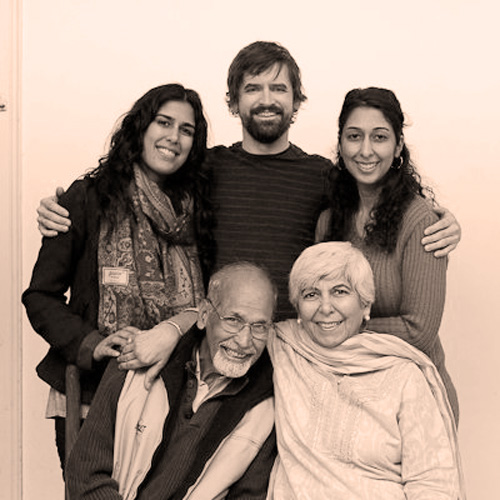
You may also enjoy reading 7 Ways to Release Grief from Your Body, by Joni Sensel.
